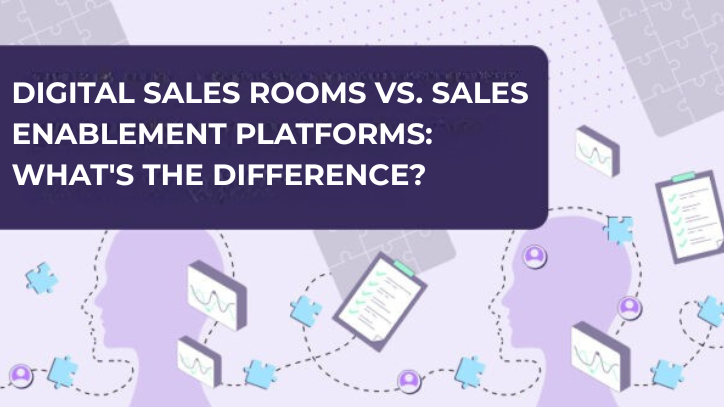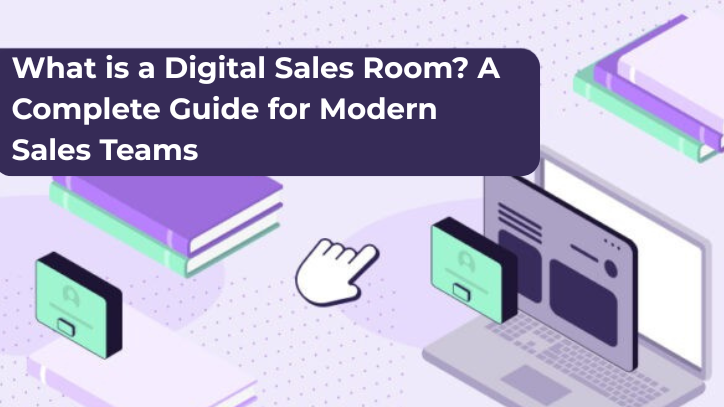In the ever-evolving landscape of SaaS sales, the demands and challenges faced by sales pros are more intense than ever before.
Not to mention, with B2B buyers becoming increasingly savvy and the decision-making process often stretched across committees, the need for adept, well-informed sales teams can’t be overstated.
This is where SaaS sales training programs come into play.
But sales demo training is not just an educational activity. It’s a strategic necessity that equips sales reps with essential skills and knowledge, ensuring they are not only ready, but also effective in front of buyers.
Innovative sales training goes beyond traditional methods by incorporating technology and interactive tools that provide reps with virtual training for SaaS sales, helping them engage more confidently and competently during interactions with prospects.
With this in mind, join us as we share 7 SaaS sales training ideas that can help you boost your win rate.
Improve SaaS sales with our interactive demo platform >
1. Identify and assess your sales team’s needs
To have a high-performing sales team, it is essential to constantly monitor and assess where improvements can be made.
This dynamic process ensures that your sales training strategies remain relevant and effective, adapting to both market changes and internal developments.
Implementing regular assessments allows you to pinpoint specific areas where your sales team excels or struggles, facilitating targeted interventions that can significantly enhance their sales performance.
Whether it’s refining your sales enablement or improving sales software training, understanding your team’s needs is crucial in maintaining a competitive edge.
Lead assessment issues
One critical area often needing refinement is lead qualification—determining which potential customers are likely to convert into sales.
Effective sales training should include strategies for accurately scoring and prioritizing leads, which involves understanding the nuances of lead behavior and engagement levels.
Sales teams equipped with robust lead assessment skills can more efficiently allocate their time and resources to high-intent prospects, thus increasing their conversion rates.
On top of this, training on interactive tools and data analysis can help sales reps in making informed decisions about which leads to pursue vigorously.
Identifying bad customers
Another key aspect of your sales team’s development is learning to identify opportunities that are unlikely to turn into profitable relationships, often referred to as “bad customers”.
These are prospects with unrealistic expectations, insufficient budgets, or poor communication habits that can drain resources and demoralize your team.
Sales training should include methods for recognizing these red flags early in the sales process.
This capability allows sales reps to focus their efforts on more promising leads, thereby optimizing the sales process and enhancing overall efficiency.
2. Use role-playing exercises to overcome objections
Role-playing exercises are an indispensable sales training technique, particularly when it comes to mastering the art of objection handling.
These interactive scenarios provide a dynamic environment for sales reps to practice and hone their responses to common objections in a controlled, yet realistic setting.
Through role-playing exercises, reps can experiment with different strategies and receive immediate feedback, enabling them to improve their approach and deliver a better performance in actual sales interactions.
Use scripts to handle common objections
When confronted with common objections, having a well-prepared script can be a game-changer for sales reps.
Demo scripts serve as a reliable blueprint that reps can personalize and adapt to the flow of conversation, ensuring they remain poised and persuasive without sounding rehearsed.
This practice not only builds confidence, but also ensures consistency in the messaging for all members of the sales team.
For example, when a prospect expresses concern over price, a scripted pivot to discussing value and ROI can smoothly redirect the conversation from cost to benefits, illustrating the script’s power in transforming potential deal-breakers into deal-makers.
Help handling fear in cold sales
Cold outreach often instills a sense of dread even in seasoned sales pros, primarily due to the fear of rejection.
However, role-playing exercises can significantly mitigate this fear by allowing reps to experience and navigate through rejection in a low-stakes environment. Through repeated exposure to the initial resistance typically encountered in cold calls or emails, reps can develop thicker skins and better stress management strategies.
This practice empowers your sales team to approach real-world cold calling with greater assurance and resilience, viewing each rejection not as a setback, but as a step closer to refinement and ultimately, success.
3. Develop sales coaching programs
In the competitive realm of SaaS sales, mentoring programs play a pivotal role in accelerating the performance of sales reps.
Experienced sales pros act as mentors, providing guidance and sharing their expertise to help newer reps navigate complex sales landscapes effectively. Such programs are crucial for honing skills in sales negotiations and deal closing, allowing reps to sell better and faster.
By leveraging the seasoned insights of mentors, reps can learn to approach sales scenarios with a strategic mindset, enhancing their ability to secure deals and foster long-term customer relationships.
Focus on consultative selling
Consultative selling is a key component of effective sales training because it emphasizes the importance of building strong customer relationships through understanding and addressing customer needs.
This technique involves listening actively to customers, asking insightful questions, and positioning yourself as a trusted advisor rather than just a salesperson.
Sales reps trained in consultative selling are equipped to tailor their pitches and solutions to the specific challenges and objectives of their prospects. This can help you enhance customer trust and increase the likelihood of successful transactions.
Through mentorship, reps learn to master this approach, which ultimately leads to higher customer satisfaction and repeat business.
Practice deal closing
Practicing deal-closing techniques is essential for any sales training program, especially in a mentorship setting where experienced reps can demonstrate how to effectively seal a deal.
Mentors can teach various closing strategies, from straightforward asks to more nuanced approaches like assumptive and summary closes, depending on the customer interaction.
Role-playing scenarios, where mentors simulate different end-stage negotiations, provide practical, real-world training that helps mentees gain confidence and competence.
Use sales team feedback
Feedback is a cornerstone of any mentoring program, and in sales, it is invaluable.
Sales training should include regular one-on-one feedback sessions where mentors and mentees can discuss performance, address challenges, and set goals for improvement.
These sessions should leverage insights not just from the mentor’s experiences, but also from peer and customer feedback, ensuring a well-rounded view of the sales rep’s abilities and areas for development.
For teams distributed across various regions, incorporating tools for video coaching and interactive training can facilitate more dynamic and engaging feedback sessions, enhancing learning outcomes and operational effectiveness across the board.
This continuous loop of feedback and refinement helps reps adapt to evolving market conditions and customer expectations, keeping the sales strategy agile and aligned with industry best practices.
4. Offer sales reps training on sales technology
The integration of sales technology into training programs is not just beneficial. It’s essential.
Sales technology, ranging from CRM systems to automation tools, empowers sales reps to perform their tasks more efficiently and with greater precision. Training sales teams on how to leverage these technologies can dramatically enhance their productivity and effectiveness. By mastering these tools, reps can automate mundane tasks, allowing them to focus on engaging with prospects and closing deals.
On top of this, sales reps who are proficient in using advanced features of sales tools can offer unique insights and solutions to prospects, demonstrating how these technologies can be harnessed to solve specific business challenges. This not only helps in building stronger relationships with prospects, but also positions sales reps as trusted advisors.
Sales software training is also crucial because it ensures that all team members can utilize the full capabilities of these tools, thereby maximizing the technology investment and driving better sales outcomes.
Implementing comprehensive training sessions, whether through in-house programs or those offered by software vendors, ensures that sales teams are equipped to meet the demands of modern buyers.
5. Enhance virtual selling skills
With the shift towards virtual interactions in the business landscape, enhancing virtual selling skills has become crucial for sales teams.
And client testimonials play a pivotal role in virtual sales presentations, providing tangible social proof that can significantly influence potential clients.
These narratives not only illustrate the effectiveness of a product or service, but also build trust and credibility with prospects by showcasing real-life applications and results.
Highlight real-life use cases and results
Incorporating real-life use cases and results into sales presentations can profoundly impact the decision-making process of potential clients.
By presenting concrete examples of how your product has successfully addressed similar challenges faced by other companies, you provide prospects with a relatable and compelling reason to believe in your solution.
For example, sharing a case study of how a particular SaaS product streamlined operations and resulted in a measurable increase in efficiency for a similar company can serve as powerful validation, encouraging prospects to envision similar success for their own business.
Incorporate visuals and data for added credibility
Visual aids and data-driven insights add substantial credibility to sales pitches, making complex information more accessible and engaging.
Charts, graphs, and infographics can help illustrate the benefits and results of your offerings more effectively than text-heavy slides.
Additionally, presenting statistical evidence or performance metrics that support the success stories of your clients or products reinforces the message, making it more persuasive.
This approach not only captures the attention of potential clients, but also bolsters the legitimacy of the claims, facilitating a stronger connection and trust between sales reps and prospects.
6. Teach sales reps how to become problem solvers
In today’s competitive market, sales reps must transcend traditional selling roles to act as consultants who solve problems for their customers.
This requires a shift towards selling based on problem solving, where active listening is paramount.
By genuinely listening to and understanding the needs and concerns of buyers, you can tailor your solutions effectively. This approach not only helps in building trust and rapport, but also allows reps to provide substantial value, making the sales process more consultative and solutions-focused.
Training sales reps in these skills transforms them from mere vendors to trusted advisors, enhancing customer satisfaction and loyalty.
7. Give incentives to the team
Incentives are a vital tool in cultivating a motivated and high-performing sales team.
They can range from financial rewards, such as bonuses and commissions, to non-financial incentives like recognition awards or additional time off. The key is to align these incentives with the company’s goals and the individual motivations of your sales reps.
Effective use of incentives fosters a culture of healthy competition and ambition, driving sales reps to excel in their roles.
In addition, when incentives are linked to the achievement of specific training milestones or the successful implementation of new sales techniques, they can significantly enhance the commitment to ongoing sales training and professional development.
Use interactive demos to improve SaaS sales training
Interactive demos have become a cornerstone of effective SaaS sales training because they give your team the practical knowledge they need by showcasing the ins and outs of your product.
Utilizing platforms like Walnut, you can show your team how your product works rather than just explaining it to them.
These demos help your team gain hands-on experience, showing them how best to use the product and how it helps different businesses.
Because once your team experiences what your product brings to the table for themselves, they’ll be better able to convey the value proposition to prospects.





